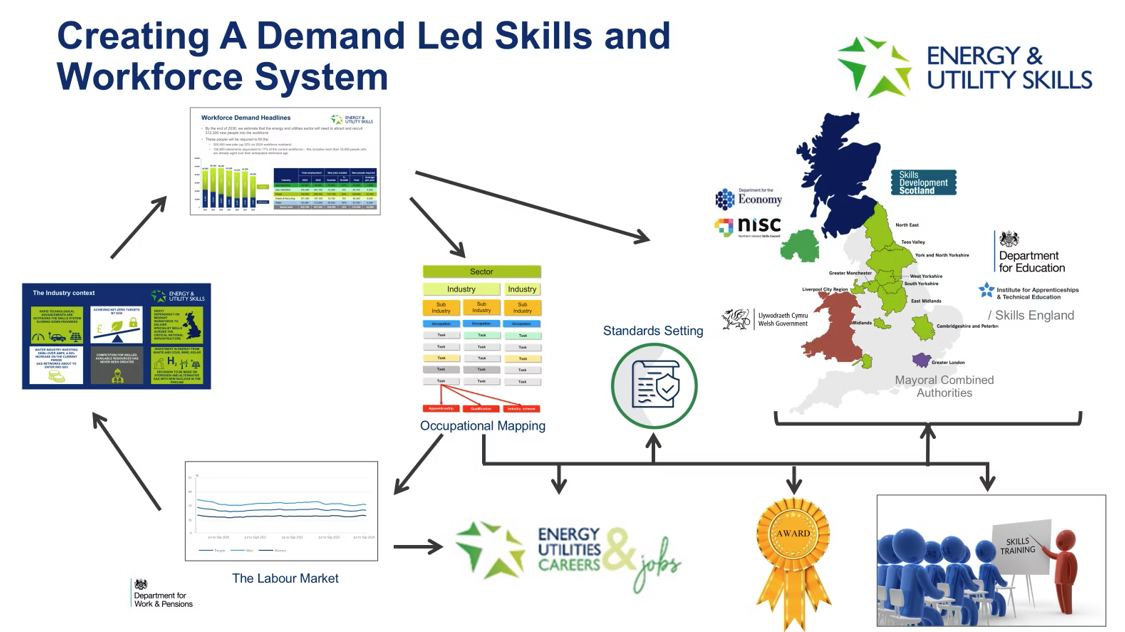Occupational Profiles
Defining roles, skills, and pathways across energy, water, and waste.
What are Occupational Profiles?
Occupational Profiles set out a clear picture of the roles that make up the energy, water, and waste industries. Each profile describes what a job involves, the skills and knowledge required, and the qualifications or pathways available to enter and progress. They make career options visible, accessible and connected.

Why They Matter
The sector will need to recruit more than 300,000 people by 2030. Clear occupational profiles help employers, training providers, and new entrants to understand:
- What roles exist and where the demand is.
- The knowledge, skills and tasks required to perform them safely and effectively.
- How people can enter the sector, gain competence, and progress their careers.
- How roles link directly to qualifications, apprenticeships, and professional standards.
By setting out consistent and trusted role information, occupational profiles provide the foundation for recruitment, demand-led training, and long-term workforce planning.
Our Services to Members
Through the occupational mapping programme, we provide members with:
- Profiles of critical roles across energy, water, and waste, including descriptions, duties, salary ranges, mandatory qualifications, and career pathways.
- Workforce demand insight, combining profiles with labour market data to show where shortages or recruitment pressures are most acute.
- Recruitment and progression tools, enabling members to use profiles in job design, training programmes, and career development frameworks.
- Alignment with standards and qualifications, ensuring all occupational profiles link directly to National Occupational Standards, apprenticeships and vocational qualifications.
- Guidance and support for HR, training and workforce planning teams to apply profiles in practice.


Working with Partners
We collaborate with employers, industry bodies and government to make occupational profiles a trusted national resource. Our work to date includes:
- Partnering with RenewableUK to complete the occupational mapping project for renewable energy.
- Working with Solar Energy UK to map roles and pathways in the solar industry.
- Acting as sector lead for the utilities pathway in the Construction Leadership Council’s super sector programme, embedding our profiles in wider infrastructure workforce planning.
- Aligning with the Hydrogen Skills Alliance to ensure new and emerging roles are captured in the occupational map.
Impact of Occupational Profiles
Occupational profiles are already shaping workforce strategy and delivery across major UK infrastructure programmes.
- Profiles are already helping members design training, identify transferable skills, and reduce duplication across their workforce pipelines.
- Working with the Offshore Wind Industry Council, occupational mapping has defined critical roles across the project lifecycle, aligned training with employer needs, and provided government with evidence to accelerate workforce readiness for net zero. Visit Occupational mapping for offshore wind for more information and to see the full details of the 16 completed profiles.
- By combining profiles with labour market data, we highlight demand and risk across energy, water and waste, supporting members and government in planning for future shortages, and improving cross-sector resilience.
Together, these projects demonstrate how occupational profiles:
- Support targeted recruitment into critical roles.
- Guide training investment and reduce time to competence.
- Enable career mobility and transfer across sectors.
- Shape national policy and funding priorities with robust evidence.
Next Steps
The first occupational profiles have already been published. In 2026 it is our ambition that sufficient profiles will have been developed to be mapped through a dedicated platform. Over time our work will grow into a sector-wide resource covering hundreds of roles, forming the basis for career guidance, workforce planning and industry training frameworks.
Get Involved
Employers, training providers and partners are encouraged to help shape and use occupational profiles. Together, we can create transparent, consistent and future-focused career pathways. To find out more, to collaborate, or to contribute, please contact: collaborate@euskills.co.uk
"*" indicates required fields
